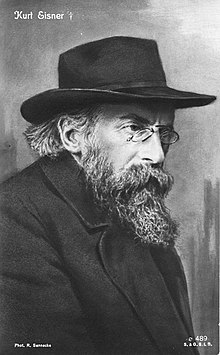German politician and journalist (1867-1919) From Wikipedia, the free encyclopedia
Kurt Eisner (14 May 1867 in Berlin – 21 February 1919 in Munich)[1] was a Bavarian politician and journalist. As a German socialist journalist and statesman, he organized the Socialist Revolution that took over the Wittelsbach monarchy in Bavaria in November 1918.[1] He is used as an example of charismatic authority by Max Weber.
Kurt Eisner | |
|---|---|
 | |
| Minister President of Bavaria | |
| In office 8 November 1918 – 21 February 1919 | |
| Preceded by | Otto Ritter von Dandl |
| Succeeded by | Johannes Hoffmann |
| Personal details | |
| Born | 14 May 1867 Berlin, Kingdom of Prussia |
| Died | 21 February 1919 (aged 51) Munich, Free State of Bavaria |
| Nationality | German |
| Political party | Independent Social Democratic Party of Germany |
Eisner was of Jewish descent.
Seamless Wikipedia browsing. On steroids.
Every time you click a link to Wikipedia, Wiktionary or Wikiquote in your browser's search results, it will show the modern Wikiwand interface.
Wikiwand extension is a five stars, simple, with minimum permission required to keep your browsing private, safe and transparent.